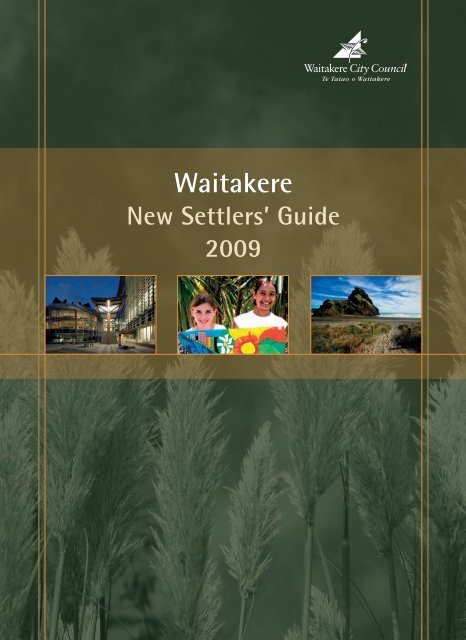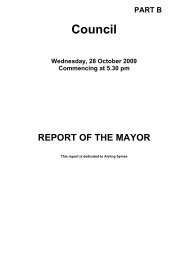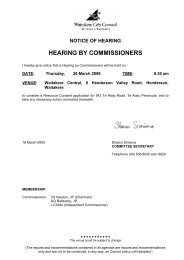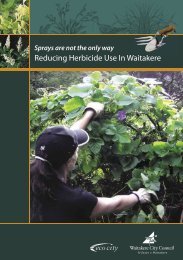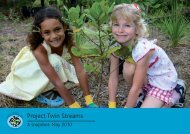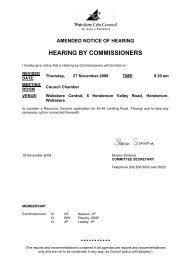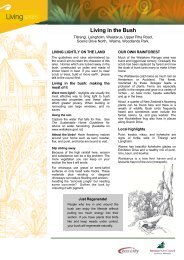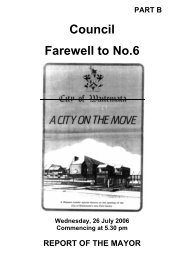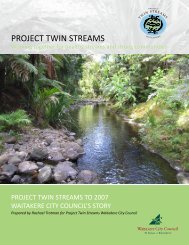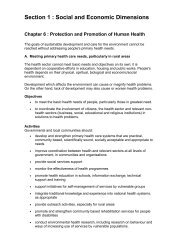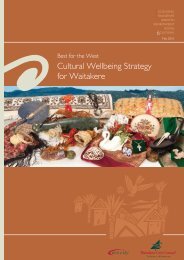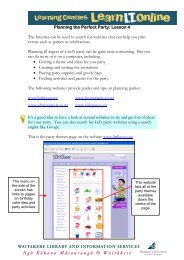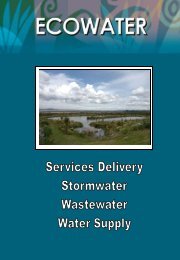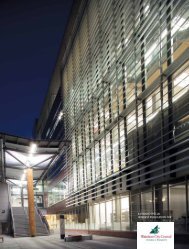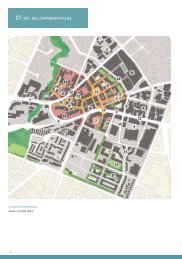Waitakere New Settlers' Guide 2009 - Auckland Council
Waitakere New Settlers' Guide 2009 - Auckland Council
Waitakere New Settlers' Guide 2009 - Auckland Council
- No tags were found...
You also want an ePaper? Increase the reach of your titles
YUMPU automatically turns print PDFs into web optimized ePapers that Google loves.
<strong>Waitakere</strong><strong>New</strong> Settlers’ <strong>Guide</strong><strong>2009</strong>
Published by <strong>Waitakere</strong> Library and Information ServicesEdited by Brendon Hickey, Migrant Information CoordinatorPrint and design by Helio Design LimitedAcknowledgements: Our sincere thanks to the many agencies, community organisationsand individuals who have made valuable contributions to this publication.This <strong>Guide</strong> is also available in electronic format at www.waitakerelibs.govt.nzYour views about this <strong>Guide</strong> are welcome and can be made by phone on 839 2260or by email at info@waitakere.govt.nzText in this <strong>Guide</strong> may be reproduced without permission but acknowledgementof the source is required. Photographs remain copyright of <strong>Waitakere</strong> City <strong>Council</strong>.Disclaimer: The information included in this <strong>Guide</strong> is drawn from many sources and was currentat the time of publication. We have attempted to ensure the authenticity of the content.However, <strong>Waitakere</strong> Library and Information Services is not able to guarantee the completeaccuracy of all information.ISBN 978-0-473-15552-0This <strong>Guide</strong> contains electronic links to the websites of manyorganisations. If you do not have access to a computer at yourhome or if you do not have experience using computers, yourlibrary can help you.Free computer training is available at yourlocal library’s Learning Centre.See the Library section in this <strong>Guide</strong> for more information.
ContentsIntroduction 1Mayoral Greeting 2Mihi 3<strong>Waitakere</strong> and <strong>New</strong> Zealand 4• Flag 4• National Anthem 4• Maps 5,6Introducing our city 7• About <strong>Waitakere</strong> 7• Eco city 7• A short history 8• Diversity 9• <strong>Waitakere</strong> City <strong>Council</strong> 10• Te Ao Maori 11Things to do first 12• Apply for a personal IRD (tax) number 13• Open a bank account 14• Find a place to live 17• Insurance 20• Find a school for your children and pre-school care 21,22• Find employment, enrol in training, start a business 23• Join a library 28• Visit your local Citizens Advice Bureau (CAB) 30• Learn English and access language support services 33• Get a driver’s licence 35• Find a family doctor and healthcare provider 36• Services for Elderly People 37• Get to know your neighbours and make new friends 38Important things to know and essential information 39• Emergency information 40• Sudden illness, accidents and hospitals 42• Police message to migrant and refugee communities 43• Civil Defence 45• Keeping yourself safe 46Everyday life and household information 48• Public holidays and daylight saving 49• Television and radio 49• <strong>New</strong>spapers 49• Phone and Internet services 50• Electricity and gas services 51• Water services 52• Rates 53
• Rubbish and recycling 54• Noise 56• Pets 57• Postal services 58• Public transport 59An introduction to the legal system 60• Births, deaths, marriages and civil unions 61• Making a will 62• Democracy and the electoral system 62• <strong>New</strong> Zealand’s legal framework 63• <strong>Waitakere</strong> Community Law Service 63Community facilities and attractions 64• Arataki Visitors Centre 65• <strong>Waitakere</strong> Ranges 65• West Coast beaches 66• West Wave Aquatic Centre 66• Art galleries 67• Trusts Stadium 67• Global Café Youth Centre 68• Community Centres and Community Houses 69Migrant and refugee support and service organisations 71• <strong>Waitakere</strong> Ethnic Board 71• <strong>New</strong> Zealand Ethnic Social Services 71• Migrant Action Trust 71• Refugee Services Aotearoa <strong>New</strong> Zealand 71• <strong>Waitakere</strong> Pacific Board 71• <strong>Auckland</strong> Regional Migrant Services 71• Refugees As Survivors <strong>New</strong> Zealand 71• Refugee <strong>Council</strong> of <strong>New</strong> Zealand 71• <strong>Auckland</strong> Refugee Community Coalition 71• <strong>Auckland</strong> Refugee <strong>Council</strong> 71Government services 72• <strong>New</strong> Zealand Immigration Service 72• Department of Internal Affairs 72• Embassies and Consular Offices 72• Office of Ethnic Affairs 72• Human Rights Commission 72Signs 73• Signs - Public places 73• Signs - Roads 74Glossary of terms 76• Some <strong>New</strong> Zealand words and phrases 76• An introduction to Te Reo - The Maori language 80Your Notes 82
SECTION ONE<strong>Waitakere</strong> and <strong>New</strong> ZealandThe <strong>New</strong> Zealand FlagThe <strong>New</strong> Zealand National AnthemMaori VersionE Ihowa AtuaO nga iwi matou raAta whakarongonaMe aroha noaKia hua ko te paiKia tau to atawhaiManaakitia maiAotearoaEnglish VersionGod of Nations at Thy feet,In the bonds of love we meet,Hear our voices, we entreat,God defend our free land.Guard Pacific’s triple starFrom the shafts of strife and war,Make her praises heard afar,God defend <strong>New</strong> Zealand.4
About <strong>Waitakere</strong>Welcome to <strong>Waitakere</strong>, the fifth largest city in <strong>New</strong> Zealand, with a population of 186,444residents (2006 Census).Fifteen minutes from downtown <strong>Auckland</strong> and approximately 30 minutes from <strong>Auckland</strong>International Airport, <strong>Waitakere</strong> is located on <strong>Auckland</strong>’s west coast and is sometimes referred toas West <strong>Auckland</strong>. It includes the magnificent <strong>Waitakere</strong> Ranges and black sand beaches and wasdeclared <strong>New</strong> Zealand’s first eco city in 1993.As an eco city, <strong>Waitakere</strong> aims to ensure that care for its natural environment is at the centre ofall development decisions. The eco city vision is about ensuring quality of life both now and in thefuture.<strong>Waitakere</strong> aims to develop its economy through innovation, including film production, tourism,wine production, value-added manufacturing, the arts, and education services, while protecting itsenvironment for the benefit of all who live here.Sustainability is about building a strong local economy, with astute use of resources, attractiveurban areas, good transport links and a safe environment for all. <strong>Waitakere</strong> has grown andprospered through the collaboration and commitment of our many communities, and the “greennetwork”, linking our parks and streams from the Ranges to the sea, is a life force of wellbeing forpresent and future generations.Haere Mai! Welcome!7
A short history of <strong>Waitakere</strong>Te Kawerau a Maki is the iwi or Maori tribe who first settled on the west coast. They are thetangata whenua - or people of the land. Their main papakainga or settlement is situated at TeHenga (Bethells Beach) on the west coast. Many of the Maori place names in <strong>Waitakere</strong> are atribute to their history.In 1830, European settlers arrived in <strong>Waitakere</strong>. Development began with timber mills and the claypottery industry in the early 19th century and rail was introduced in 1880. You can still see theremnants of the timber dams and bush railways today. Historical places to visit include the FallsHotel (pictured) and Park, the Corban Winery Estate and Waikumete Cemetery (with its Sexton’sHouse and Chapel of Faith in the Oaks).In the latter part of the 20th century the <strong>Waitakere</strong> area was rapidly urbanised to accommodatea growing population and post-war migration from within and outside <strong>New</strong> Zealand. The largescale building of state housing and extensive motorway construction was accompanied by theemergence of manufacturing industries and new business development. More recent technologicalinnovation has seen <strong>Waitakere</strong> become home to sophisticated marine companies providing seacraft for the international market and the establishment of more organic horticultural enterprises.<strong>Waitakere</strong>’s identity in the early 21st century is one of a modern, thriving and cosmopolitan city ofmany diverse peoples, proud of its history and confident of its future. The pristine hinterland of the<strong>Waitakere</strong> Ranges and the stunning coastal environment provide a unique balance to the vibrantstreet life and multicultural flavours of our urban centres - a city we can be proud of and one thatis envied by many who live elsewhere.8
<strong>Waitakere</strong> - a diverse and dynamic cityOne of the strengths of <strong>Waitakere</strong> is its cultural diversity and our city is made up of people of over160 nationalities, with 148 languages spoken. In recent years, <strong>Waitakere</strong> has welcomed refugeesfrom Iraq, Afghanistan, Burma, Burundi and many other countries and as <strong>New</strong> Zealand’s ethnicmake-up has evolved so has the population of <strong>Waitakere</strong>. The most recent census, conducted in2006, shows that <strong>Waitakere</strong>’s Asian population has doubled since 1996.The following table shows the ethnic composition of <strong>Waitakere</strong> based on the Level 1 classificationused by Statistics <strong>New</strong> Zealand.Ethnic Group 1996 2001 2006Asian 8% 11% 16%European 79% 72% 59%Maori 14% 13% 13%MELAA (MiddleEastern, LatinAmerican and African)Not Applicable Not Applicable 2%(new category for 2006)Pacific Peoples 12% 15% 15%Other 1% 1% 8%9
<strong>Waitakere</strong> City <strong>Council</strong><strong>New</strong> Zealand has a system of local democracy where locally elected representatives at localcouncils make decisions about what needs to happen in their communities, and when. They alsodeliver day-to-day functions and services that help communities run smoothly. Elections areheld in October every three years (2010, 2013 etc). Local government’s ability to provide for localcommunities can differ from place to place. At the time of publication a Royal Commission haspresented recommendations to the government on the future system of local government in thewider <strong>Auckland</strong> region.<strong>Waitakere</strong> City <strong>Council</strong> is responsible for the city’s:Economy - promoting businesses and the jobs they provide for people.Environment - safeguarding its life-supporting capacity and protecting it for present and futuregenerations as set out under legislation.Society - ensuring the city remains a safe, healthy and enjoyable place for people.<strong>Waitakere</strong> City <strong>Council</strong> values its partnerships with Te Taumata Runanga, the <strong>Waitakere</strong> PacificBoard and the <strong>Waitakere</strong> Ethnic Board. <strong>Council</strong> meetings are open to the public.For all enquiries about <strong>Council</strong> services:<strong>Waitakere</strong> City <strong>Council</strong> 24 hour Call CentrePhone 09 839 0400(If English is not your first language, ask for Language Line)www.waitakere.govt.nz<strong>Waitakere</strong> Central - <strong>Waitakere</strong> City <strong>Council</strong> Civic Centre6 Henderson Valley Road Henderson, <strong>Waitakere</strong>10
Te Ao Maori, The Maori worldMaori culture is paramount within <strong>New</strong> Zealand and Maori cultural values are alive and thriving in<strong>Waitakere</strong>. Maori is an official language protected by legislation and learning the Maori language(te reo) is a good way to gain an understanding of Maori culture. Your local library is a good placeto start and the Kaiwhakahaere Maori (Maori Services Librarian) can help with arrangements forindividuals or groups wanting to find out more.The Treaty of Waitangi was signed in 1840 and is the founding document expressing thepartnership between Maori and Europeans in Aoteroa / <strong>New</strong> Zealand. Each year the signing of theTreaty is commemorated on 6 February and this day is a public holiday.More information about the Treaty of Waitangi and Waitangi Day can be found on the website ofthe Ministry of Culture and Heritage at www.mch.govt.nz11
SECTION TWOImportant things to do first:* Apply for a personal IRD (tax) number* Open a bank account* Find a place to live* Insurance* Find a school or kindergarten for your children* Find employment and / or training opportunities* Join a library* Visit your Citizens Advice Bureau* Improve your English and access language support* Get a driver’s licence* Find a family doctor and healthcare provider* Networks for elderly people* Get to know your neighbours and make new friends12
Apply for a personal IRD (tax) numberIf you work or are in business, you must pay tax. To do this you need an IRD number.To get an IRD number, call the Inland Revenue Department (IRD) on 0800 227 774 or visit theIRD website at www.ird.govt.nzAll the necessary application forms can be downloaded from the IRD website. You will need to haveyour identity documents verified as part of the application process.IRD can provide all the tax information necessary for:* Individuals and families* Businesses and employers* Not for profit groups* Non-residents and visitors* Student Loans* Family assistance* Child support* GST (Goods and Services Tax)13
Open a bank accountIt is a good idea to open a bank account as soon as possible. It can be risky to unnecessarily carrycash with you and employers will need you to have a bank account number in order to bank wagesdirectly.Banks usually ask for three forms of identification, one of which should have a photo on it, forexample a passport or overseas driver’s licence. Banks offer different fee structures for transactions.Talk to several before deciding which best suits your needs. Some banks will provide services inlanguages other than English.PIN (personal identification number)Ask your bank to give you a PIN number that you will need for electronic banking. Do not discloseyour PIN to anyone. If you lose your bankcard or think someone else has your pin, contact yourbank immediately on their 0800 number, which you can get from the telephone directory.Electronic bankingOnline banking, automatic teller machines (ATMs), EFTPOS (making purchases with your bankcard)and telephone banking are the common forms of electronic banking. You can do your bankingwithout visiting a local branch and use banking services 24 hours a day.Internet bankingThis service allows customers to check their account balances and transfer funds between differentaccounts online. Your bank can explain how this works.ATMs (Automatic Teller Machines)These machines are available in most shopping centres and will allow you to withdraw and depositmoney and check your account balance at any time of the day or night. You can also use ATMS notowned by your bank (a small additional transaction fee may apply).14
EFTPOS (Electronic Funds Transfer at Point of Sale)EFTPOS is available at most shops in <strong>New</strong> Zealand. You have to use your EFTPOS card to transfermoney and make payments using these machines. You also need a PIN.Telephone bankingTelephone Banking allows customers to check account balances and make payments without goinginto the bank. Your bank will set up this service and you can then ring the number provided and anautomated message will tell you what to do.Automatic payment (AP)If you want to pay someone the same amount of money on a regular basis, such as your rent,buying things on hire purchase or paying a salary, you can set up an Automatic Payment AuthorityForm at your bank.Direct debitWith Direct Debit you give permission to a bank or business to take money out of your account.The amount can be the same or different each time. If the amount changes, the business takingout the funds must give you 10 days notice and tell you how much money is coming out of theaccount and the dates when this will take place.ComplaintsAll banks, by law, must have a process that allows customers to make complaints. If you have aproblem, you can ask to speak to the complaints officer. If you are not satisfied with the way yourcomplaint has been handled, you can ask the Banking Ombudsman for help. This service is free.Some of the common banks in <strong>New</strong> Zealand are:KiwibankBank of <strong>New</strong> ZealandNational BankANZ BankWestpac BankTSB Bankwww.kiwibank.co.nzwww.bnz.co.nzwww.nationalbank.co.nzwww.anz.co.nzwww.westpac.co.nzwww.tsbbank.co.nz15
Housing <strong>New</strong> ZealandHousing <strong>New</strong> Zealand provides a range of housing services for people on low to moderate incomes,or those with special needs. For migrants to be eligible to apply for a state house they must bepermanent residents for two years or receive an emergency benefit, due to hardship. Eligibleapplicants are placed on a waiting list and priority is given to those with the greatest housingneeds, rather than to those who have waited the longest.Once the application for housing is lodged with Housing <strong>New</strong> Zealand, you are assessedto determine your housing need. The assessment considers things like your current livingarrangements and social, medical and personal needs. This ensures that those with the greatestneed receive help first.Quota refugees are automatically eligible to apply for a Housing <strong>New</strong> Zealand house.Tenants and applicants who are not confident speaking English can access Language Line - a freetelephone interpreting service. Ask a Housing <strong>New</strong> Zealand staff member for Language Line help.Housing <strong>New</strong> Zealand tenants pay either an income-related rent or a market rent. Those whoseincome is below a set threshold pay an income-related rent of no more than 25 per cent of theirincome. Tenants who earn more than this threshold pay up to the maximum market rent for theproperty. Exactly how much depends on income.Housing <strong>New</strong> Zealand20 Sel Peacock DriveHendersonPhone: 261 5021Freephone Housing <strong>New</strong> Zealand any time on 0800 801 601 or visit www.hnzc.govt.nz18
Buying a propertyYou can buy a house only if you can pay the full price of the property or arrange a long-term loan(mortgage) from a bank or lending institution. The bank will look at your income, what you own,your debts, and your credit rating. Most banks will ask you to pay a deposit of the price (this maybe 10 per cent) of the house before allowing you to have a mortgage. Talk to your bank for moreinformation about lending criteria and processing fees.Mortgages are available from banks, credit unions, finance houses, insurance companies andsavings and loan associations. Make sure you choose the mortgage that is most suitable for you.Processing feesAll lenders charge a fee for processing your loan, which is usually one per cent of the amountborrowed, but can sometimes be less.Buying from a real estate agentIf you want to buy a property involving a real estate agent, you must register your interest withthe agent. You will need a lawyer to ensure the value of the property, that you have the money,and confirm the conditions of sale agreement before the contract becomes unconditional. Realestate agents have offices in most shopping centres and they advertise in the Yellow Pages.Buying privatelyYou can buy a property privately by making an offer or by negotiation. You still need a lawyerbefore signing the contract for the sale of the property.Buying at auctionIf you want to buy a property at auction you must register your interest with the estate agent. Talkto your lawyer about the value of the property, make sure you have the money and arrange whowill make the bids at the auction.The Real Estate Institute of <strong>New</strong> Zealand is responsible for the regulation of the real estate industryand you can find more information about purchasing a property and market trends atwww.reinz.org.nz®19
Insurance<strong>New</strong> Zealand is a safe country for residents and visitors. However, unforeseen problems can arisefrom time to time and accidents happen to all of us. You might want to insure your property andpossessions against fire, theft or damage. Similarly, health insurance and / or car insurance may bea priority for you and your family.There are many companies that can provide insurance. Insurance protects people and things thatyou value in the case of accidents or emergencies.When it comes to choosing an insurance company or plan, some useful information is provided freeby the Consumers’ Institute of <strong>New</strong> Zealand. This independent organisation conducts an annualsurvey of house and contents insurance providers that can be useful in helping you find the mostsuitable cover.Consumer magazine is a very useful resource when purchasing a whole range of products andservices, including results of product tests and evaluations (such as value for money, featuresand reliability) compared to other products of the same type. It is available at your local library.Subscribers also receive in-depth information on how insurance works and how to make a claim aswell as advising on how to avoid traps.More information is available on freephone 0800 266 786 and at www.consumer.org.nz20
Find a school for your childrenAll children in <strong>New</strong> Zealand must attend school from age6 to 16. Compulsory education is divided into primary,intermediate and secondary schooling. You can findanswers to frequently asked questions and a list of schoolsin <strong>Waitakere</strong> on the Ministry of Education website atwww.minedu.govt.nzThe Education Review Office monitors the performance ofall schools in <strong>New</strong> Zealand and parents can view reports atwww.ero.govt.nzPrimary schools cater for children aged from 5 to 10. Children aged 11 to 12 may be in a separateintermediate school or part of a primary, secondary or composite school. Secondary schools providefor students aged from 13-17 years.Types of schools:State schools: Funded through taxation. Some state schools offer special programmes for adulteducation classes.Special schools: State schools that provide education for students with special physical, sensory,emotional or intellectual needs.Integrated schools: Schools that used to be private that have now become part of the Statesystem.Boarding schools: Students usually live at the school all week and may come home at weekends.Correspondence schools: They provide distance learning facilities to students who may live a longway from their nearest school.Home schooling: Available for parents and caregivers who want to educate their children at home.Home zones:Check the school zone before enrolling your child in a school. If you live out-of-zone you shouldfind out if the school has any enrolment schemes to enable your child to attend.School terms:• Term 1: End of January until mid-April• Term 2: Late April until beginning of July• Term 3: Mid-July until late September• Term 4: Mid October until mid-December21
Pre-school learning, child care and maternity support<strong>Waitakere</strong> Online provides extensive information when it comes to finding suitable early childhoodlearning and childcare in <strong>Waitakere</strong>. More information can be found at www.waitakereonline.co.nzEarly Childhood Education <strong>Waitakere</strong> can help you find the right option for your family andprovides answers to frequently asked questions. To find out more go to www.eceexpress.co.nzChild, Youth and Family (CYF) is a government agency with responsibility for ensuring the safetyand wellbeing of young people. CYF has lot’s of resources on positive parenting and can provideadvice and guidance to parents on choosing a crèche, day care or after school care for childrenMore information can be found at www.cyf.govt.nzPlaycentres provide quality early childhood education and a cooperative family experience. To findout more and to find a Playcentre near you go to www.playcentre.org.nzIf you’re pregnant a Lead Maternity Carer (LMC) is responsible for organising a woman’s maternitycare and choices. They provide information to assist with decision making during pregnancy,preparation for the birth and information on a wide range of matters including nutrition, painrelief, breastfeeding and immunisation. For more information phone 0800 MUM 2 BE (0800 686223).Plunket is <strong>New</strong> Zealand’s largest provider of support services for the development, health andwellbeing of children under 5 years. These services are available free to families. Plunket nursesprovide support through clinics and home visits and PlunketLine a free telephone advice service forparents. Plunket also organises car seat rental schemes, parent groups, parenting education and toylibraries. Plunket services are available at several locations in <strong>Waitakere</strong>. Check your Yellow PagesWest <strong>Auckland</strong> Directory for details.PlunketLineFreephone: 0800 933 922Web: www.plunket.org.nz22
Find employmentTo work in <strong>New</strong> Zealand you must have:• Citizenship in <strong>New</strong> Zealand or Australia, or• A residence permit, work permit or a Variation of Conditions that allows you to work on astudent or visitor permit.If you have any doubt about your eligibility to work in <strong>New</strong> Zealand, contact the <strong>New</strong> ZealandImmigration Service National Contact Centre on the following numbers:914 4100 if calling from within the <strong>Auckland</strong> area0508 558 855 if calling from within <strong>New</strong> Zealand but outside <strong>Auckland</strong>64 9 914 4100 if calling from outside <strong>New</strong> ZealandOr visit the website at www.immigration.govt.nz23
QualificationsIt is important to have your educational qualifications approved by the <strong>New</strong> Zealand QualificationsAuthority (NZQA). If you want to practice a profession in <strong>New</strong> Zealand you may need to apply forregistration or membership of a professional body. To find out more go to www.nzqa.govt.nzJob vacancy websites (in addition to classified advertisements in newspapers):<strong>New</strong> Zealand Herald Onlinewww.jobs.nzherald.co.nzSeekwww.seek.co.nzTrade Mewww.trademe.co.nz/Jobs<strong>New</strong> Zealand Governmentwww.careers.govt.nzLocal Governmentwww.localgovernmentcareers.govt.nzMigrant employment supportThe <strong>Auckland</strong> Regional Migrant Services Trust (ARMS) provides an extensive range of services andworkshops for people who are new to <strong>New</strong> Zealand. ARMS organises regular job search workshopsfor migrants in central <strong>Auckland</strong>. More information can be found at www.arms-mrc.org.nzCareer Services is a government agency providing free career advice and resources (there may besome eligibility criteria for individual consultations). For more information go towww.careers.govt.nzWork and Income is part of the Ministry of Social Development and can help you find work. Youcan also find out about financial assistance that may be available to you and your family.36 - 44 Sel Peacock DriveHendersonPhone: 912 6865 & 0800 599 009Web: www.workandincome.govt.nz<strong>New</strong> Kiwis is a free job site for skilled migrants who are seeking employment. Job seekers canpromote their profiles to employers who use the website to search for the skills they require. Moreinformation can be found at www.newkiwis.co.nz24
Omega provides programmes and mentoring schemes in the <strong>Auckland</strong> region for internationallytrained professionals. More information can be found at www.omega.org.nzThe Migrant Action Trust organises employment support groups for migrants and refugees (theremay be some eligibility criteria). For more information go to www.migrantactiontrust.org.nzThe Human Right Commission provides useful resources for employers and employees to overcomepotential problem areas relating to discrimination in the workplace and in pre-employmentsituations. The full Pre-Employment <strong>Guide</strong> can be found at www.hrc.co.nzThe Employment Relations Service is the government department responsible for administeringemployment legislation. Their information service includes a comprehensive website providinganswers to all sorts of questions about employees’ rights, entitlements and obligations. Moreinformation can be found at www.ers.dol.govt.nz and Freephone 0800 20 90 20.You are entitled to representation in your workplace and many worksites have collectiveemployment agreements negotiated by unions. To find out more visit the <strong>Council</strong> of Trade Unionswebsite at www.ctu.org.nz or phone 0800 MY UNION.Adult education and trainingThere is a comprehensive selection of affordable, accessible education and training available in<strong>Waitakere</strong> for people aged 16 and over. Many courses are held in the evenings at local schools andmore information can be found at www.westaucklandcomed.co.nzAce Space, <strong>Waitakere</strong> Learning Shop is a friendly place to get information and advice on adultand community education and training opportunities.Ace Space12 Railside AvenueHendersonPhone: 837 0489Email: acespace@xtra.co.nz25
Start a businessIf you’re interested in starting your own business you’ll find a number of agencies that can providesupport and assist you in developing opportunities to be successful in the commercial environment.The Companies Office, part of the government’s Ministry of Economic Development, administersthe Companies Act (legislation governing the registration and operations of businesses). Setting upa company in <strong>New</strong> Zealand is easy but there are legal requirements that must be complied with. Allthe information you require about registering your company and your legal responsibilities can befound on the Companies Office website at www.companies.govt.nzThe Ministry of Economic Development provides extensiveinformation and resources about doing business in <strong>New</strong> Zealand,while the government’s business website can tell you all youneed to know about starting, managing and growing yourbusiness. More information is available atwww.med.govt.nz and www.business.govt.nzThe Employers and Manufacturers Association (EMA) providesadvocacy, advice and network support for enterprises. Moreinformation can be found at www.ema.co.nzBusiness <strong>New</strong> Zealand seeks to maintain and develop <strong>New</strong> Zealand’s international competitivenessand supports policies to promote growth and investment. Members can receive advice on legalmatters, health and safety and employment relations. To find out more go towww.businessnz.org.nz<strong>New</strong> Zealand Trade & Enterprise provides access to experienced people, market knowledge andservices to help <strong>New</strong> Zealand businesses grow and succeed in the global economy. For moreinformation go to: www.nzte.govt.nz<strong>Waitakere</strong> Enterprise is an economic development agency that hasdemonstrated leadership in sustainable city development. An independenttrust, <strong>Waitakere</strong> Enterprise provides services including business information,training and mentoring, new business start-up training and coaching, centralgovernment funding advice, business location information and assistance andmuch more. More information is available at www.waitakereenterprise.co.nzEmployers & Manufacturers Association (Northern)27
Join a libraryThere are seven public libraries in <strong>Waitakere</strong> and membership is free to all residents. Joining up iseasy - all you need to do is visit your local library with both photo and address identification (e.g.driver’s licence or passport, an account from your phone or power company etc).Library services include:• Learning CentresFree online services, computer training and job seeker support• Children’s and Teens’ ServicesComprehensive collections, regular story times, summer reading programmes• Multicultural and Migrant ServicesResources in over 40 languages, specialist support, introductory tours• Kaiwhakahaere MaoriPukapuka collection, whakapapa (genealogy), iwi / hapu histories• Local History and Research ServicesHeritage materials, archives, special collections, photographs, oral histories28
Citizens Advice BureauYour local Citizens Advice Bureau (CAB) is a confidential and free community information, adviceand referral service that is available throughout the country. CABs are for everyone in <strong>New</strong> Zealandand there are four CABs in <strong>Waitakere</strong>, at Henderson, Massey, <strong>New</strong> Lynn and Glen Eden. Each CAB isadjacent to a library.Everyone needs information sometimes. We’re all tenants or householders, taxpayers, consumers,parents... and problems come at us every day from all directions. At your local CAB you can findanswers to difficult questions and be put in touch with the services you need.CAB volunteers are specially trained to listen to you and to impartially provide the informationyou need. Your CAB has up-to-date local, regional and national information about your rights,government policies and legislation, community services and all sorts of organisations.Justice of the Peace services are available and you can also access the Settlement Support serviceat your CAB.Your CAB can help you with information on:• Consumer rights• Education and training• Work and unemployment• Income support and benefits• Budgeting, finance and tax• Health and counselling• Legal advice, disputes and human rights• Housing and tenancy• Personal, family and community issues• Immigration• Hobbies, sports and social activities• And many other issuesCAB Language Link ensures that language need not be a barrier when people are seekinginformation and assistance. This telephone service provides information, advice, support andadvocacy in 26 languages (see the listing on page 31).CAB Language LinkPhone 624 255030
Improving your English and language supportKnowledge of English is crucial in <strong>New</strong> Zealand. If you feel that you need help with yourcommunication skills, you can enrol in classes to improve your English. There are many optionsavailable so that you can learn at a pace that is suitable for you.Classes are referred to as ESOL - English for Speakers of Other Languages. In <strong>Waitakere</strong> there are anumber of service providers for people wanting to improve their English. This includes secondaryschools, private training establishments, community education groups, libraries and churchorganisations. Copies of the <strong>Waitakere</strong> ESOL Directory are available at your local library or CAB.English Language Partners <strong>New</strong> Zealand (formerly ESOL Home Tutors) is the country’s largestESOL service provider with over 3000 volunteers.English Language Partners <strong>New</strong> ZealandGate 3, Building 60PO Box 44242 Pt ChevalierUNITEC <strong>Auckland</strong> 1025Carrington Road<strong>Auckland</strong> 1246Phone: 846 0398Email:info@esolht.net.nzWeb: www.esolht.org.nzWhile you are learning English you will find that there is a lot of information available to you inyour first language. Most government departments produce resources and fact sheets in severallanguages. District Health Boards provide translation and interpreting services. The Citizens AdviceBureau has Language Link (available in 26 languages) and the Office of Ethnic Affairs providesLanguage Line, a telephone interpreting service available in 35 languages to assist people in theirinteraction with government agencies.33
Language Line - languages availableAmharicFarsiMaoriSomaliArabicFrenchBurmeseSpanishAssyrianGujaratiNiueanTamilBengaliHindiPashtoThaiBosnianJapanesePortugueseTokelauanCantoneseKhmerPunjabiTonganCook Is MaoriKoreanRussianTuvaluanCroatianKurdishSamoanUkrainianDariLaoSerbianUrduEnglishMandarinSinhaleseVietnameseLanguage Line - selected participating agenciesOrganisationPhone Number<strong>Waitakere</strong> City <strong>Council</strong> 09 839 0400<strong>Waitakere</strong> Community Law Service 09 835 2130Career Services 0800 222 733Child, Youth & Family 0508 326 459Department of Internal Affairs - Passport Office 0800 225 050Department of Internal Affairs - Citizenship Office 0800 225 151<strong>New</strong> Zealand Immigration Service 0508 558 855Employment Relations Service 0800 209 020Healthline 0800 611 116Housing <strong>New</strong> Zealand Corporation 0800 496 877Human Rights Commission 0800 496 877Inland Revenue 0800 227 774Ministry of Consumer Affairs Consumer Line 04 474 2750NZ Police - contact your local Police Station 09 839 0600Tertiary Education Commission (English for Migrants) 0800 601 301A full list of national organisations that provide Language Line is available on the Office of EthnicAffairs website at: www.ethnicaffairs.govt.nz34
Get a driver’s licenceYou can drive using a current overseas licence (withauthorised English translation) or an internationaldriving permit for a maximum of one year after youarrive. You must then convert your overseas licenceto a <strong>New</strong> Zealand driver’s licence.You will have to pass a theory test and, dependingon the country you have come from, pass a practicaldriving test as well.The <strong>New</strong> Zealand Transport Authority and its driver licensing agents can supply you with anapplication form for an overseas licence conversion. If you have never had a driver’s licence before,you will have to pass a theory test for a “Learner licence”.Drivers who are new to this country, people learning to drive and people wanting to gain a newlicence need to refer to the ROAD CODE. You can buy a copy at book stores or read one at yourlocal library.It is the driver’s responsibility to ensure the road worthiness of the vehicle being driven and thatthe vehicle’s particulars are compliant with regulations. All vehicles on the road are required tobe registered and to display a current warrant of fitness. There are stringent penalties for noncompliance.For more information visit www.landtransport.govt.nz or phone 0800 822 422Automobile Association (AA)The AA can assist with any questions regarding vehicles, licences,maps and travel information.To find out more visit www.aa.co.nzThere are two AA offices in <strong>Waitakere</strong>:Lynmall, Memorial Drive, <strong>New</strong> LynnPhone 826 4921road codeIncluding licence and study guideWestgate, Corner Westgate Drive and Fernhill Drive, MasseyPhone 833 370035
Find a family doctor and healthcare providerThe local doctor or General Practitioner (GP) is the important first contact for people in <strong>New</strong>Zealand if they get sick. Doctors’ practices and medical centres are often privately owned and areusually not located in a hospital.To find a doctor in your local area refer to the White pages of the phone book under the sectionfor Registered Medical Practitioners and Medical Centres. You are free to register with a doctor ofyour choice. The Ministry Health provides guidance on choosing a doctor and detailed informationon eligibility to access health services in <strong>New</strong> Zealand. For more information visit the Ministry’swebsite at www.moh.govt.nzIf you decide to change your doctor, it is important to tell your new doctor about previousregistration, so that your medical files can be transferred.Waitemata District Health Board (DHB) can provide you with information about the range ofhealth services in your local area. This includes information about providers, medical specialists,primary and secondary care, common treatments and patient rights. For more information go towww.waitematadhb.govt.nzHealthpoint can help you find the hospital, clinical, specialist and maternity services you require.Go to www.healthpoint.co.nzWaitemata Webhealth can put you in contact with health and social support services in <strong>Waitakere</strong>.Waitemata WebhealthPhone: 0800 WEBHEALTHEmail: waitemata@webhealth.co.nzWeb: www.waitemata.webhealth.co.nzPrimary Health Organisation (PHO)This is a not for profit organisation funded through the District Health Board. It is a good idea toenrol with a GP belonging to a PHO as they have better access to a range of primary health servicesand you can benefit from a number of their other services,including cheaper prescription charges for certain groups.To enrol, once you have chosen a GP/Family doctorpractice or Primary Health provider clinic, go to them andfill in an enrolment form.HealthWest PHO55 - 75 Lincoln Road, Henderson, <strong>Waitakere</strong>Phone: 839 0556Web: www.healthwest.co.nz36
Community Services Card (CSC)Permanent residents who are on a low to middle income may be eligible for a Community ServicesCard from Work and Income (WINZ) to help with the cost of prescriptions and doctors fees. Callfreephone on 0800 999 999 to see if you are eligible.High User Health Card (HUHC)People who visit their doctor 12 times or more in 12 months because of continuing healthproblems and who do not have a Community Services Card, can apply for a High User HealthCard. It gives the cardholder a higher subsidy on visits to the doctor and on prescription charges.If you think you may qualify ask your doctor to check you records, the doctor needs to make anapplication for you.Pharmaceutical Subsidy Card (PSC)This card allows the cardholder and named family members to pay a lower amount on governmentprescription charges. The purpose of the card is to help people who face high prescription costs butwho do not have a CSC or a HUHC. Your local pharmacist will keep a prescription count for yourfamily and if eligible will issue a PSC to you.Healthline is a free telephone information service for all the family.The service is staffed by registered nurses who will assess your health needs, andgive information and advice to help you decide on the best level of care.HealthlineFreephone 0800 611 116www.healthline.govt.nzNetworks, care and support for elderly peopleThere are extensive social networks for senior residents in <strong>Waitakere</strong> and lots of activityprogrammes at Community Centres. Free copies of the <strong>New</strong> Zealand Retirement <strong>Guide</strong> can beobtained at your local CAB.Age Concern is a national organisation serving the needs of older people. You can find answers toquestions about health, safety, happiness, getting out and about and more.www.ageconcern.org.nzSeniorNet West <strong>Auckland</strong> helps people get connected online and to make the most of technologyand new communication methods. www.seniornet-west-auckland.org.nzElderNet has comprehensive information about services that are available for older people.www.eldernet.co.nz37
Get to know your neighbours and make new friendsAs a goodwill gesture, its a good idea to introduce yourself early to your new neighbours.<strong>Waitakere</strong> is known for the friendly welcomes provided to new residents and people generallylike to know at least a little bit about new people in the neighbourhood. You may be pleasantlysurprised by the warmth and kindness shown by locals or you may find that some people like tokeep to themselves. Either way, a friendly “hello” can help break the ice and make your settling in amore comfortable experience.<strong>Waitakere</strong> is a city with so many community, sports, social and recreation clubs that you’ll besure to make connections with people who share your interests and who will welcome yourinvolvement. You can find out more by:• Visiting your local Citizens Advice Bureau, library or Community Centre• Checking out <strong>Waitakere</strong> Online at www.waitakereonline.co.nz• Visiting Community <strong>Waitakere</strong> at www.communitywaitakere.co.nz• Checking out Neighbourhood Support at www.neighbourhoodsupport.co.nz• Contacting organisations in the voluntary sector at www.volunteernow.org.nz• Reading your local newspaper, the Western Leader (delivered free to households) and other freelocal newspapers.38
SECTION THREEImportant things to know• Emergency information• Sudden illness, accidents and hospitals• Police message to migrant communities• Civil Defence• Keeping yourself safe39
Emergency informationPLEASE HELP ME!Dial 111 for Fire, Ambulance or Police.In an emergency try to remain calm and explain briefly what hashappened. More information about emergency services can be foundon the inside covers of the Yellow Pages and White Pages.Phoning the Ambulance - Dial 111Ambulance Service: Hello, Ambulance serviceCaller: My name isMy Address is:Street numberStreet nameSuburbCityAmbulance Service: What has happened?Caller: (brief explanation e.g. high fever, breathlessness, dehydration) tell them what is wrong.Ambulance Service: Is the person conscious? (awake)Caller:(Yes/No)Ambulance Service: Is the person breathing?Caller:(Yes/No)Ambulance Service: Where is the pain?Caller:(e.g. stomach, chest)Ambulance Service: Is the person bleeding?Caller:(Yes/No)40If you have difficulty answering other questions, clearlytell them your address, so that the ambulance can reach you quickly. There is a charge for using theAmbulance Service and an invoice will be sent to you.
Phoning the Fire Service - Dial 111Fire Service: Hello, Fire ServiceCaller:(Explain why you are calling fire service).Fire Service: What is the address?Caller:Street nameSuburbCityAny landmarkIt is very important to give the correct address to the emergency services so they can cometo help you quickly.Phoning the Police - Dial 111Police: Hello, PoliceCaller: My name isMy Address is:Street nameSuburbCityPolice: What has happened?Caller:(Explain the emergency.)If you have a problem speaking English, tell them thelanguage you speak. The Police will connect you to theInterpreter Services, which will be a conference call orthree-way conversation.The non-emergency phone number for the Police in<strong>Waitakere</strong> is 839 0600.41
Accident and sudden sicknessIn the case of a sudden sickness or serious accident, you can visit an Accident and Medical Centre,often called an A and E (Accident and Emergency Clinic), in your local area, or the emergencydepartment of a public hospital.<strong>Waitakere</strong> Hospital55 - 75 Lincoln Road HendersonPhone 839 0000 or Freephone 0800 80 93 42The Emergency Care Centre does not provide 24 hour service at<strong>Waitakere</strong> Hospital. It is open every day from 8.00 am to 10.00 pm.Accident & Emergency Clinics:White Cross Westcare Henderson (24 hours)131 Lincoln Road, HendersonPhone: 836 3336White Cross Westcare <strong>New</strong> Lynn (8.00 am to 10.00 pm)2140 Great North Road, <strong>New</strong> LynnPhone: 828 891242
A Police message to the migrant communities in <strong>Waitakere</strong><strong>Waitakere</strong> is a safe place to live in. There are no particular suburbs that can be classed as unsafebut as in all cities some areas can be defined as better than others. If you are new in the city,making use of the tips given below will help you to reduce your vulnerability to becoming a victimof crime.Motor vehicle crime:• Make sure you lock your car’s ignition and remove the keys before you leave your car, even if ata petrol station or shop.• Make sure that you lock all doors and windows and do not leave any valuables in the car whichcan be seen from outside.• Do not leave purses, handbags or important documents such as credit cards, ownership papersand insurance papers in an unattended car.• Look for well-lit areas to park the car at night-time.• If your car is stolen, report this immediately to the police.• Mark auto accessories with your driver licence number.Accessories such as wheels and wheel covers can be engraved.Prevention against burglaries:• An alarm system is one of the most effective crime prevention deterrents.• Make sure appropriate security bolts are fitted to all doors and windows.• If you are planning to be away for a long period of time on holiday, giving your house a livedinlook can be a deterrent to burglars. Have a neighbour empty your letterbox and arrangethe lawn-mowing to be done before you leave. Uncut lawns can only help to make your housestand out.• Automatic sensor lighting covering each exterior doorway can also add security to the house.• Do not hide keys in the mailbox, planters, under doormats or other places at your residence.• Keep your house number clearly visible from the street both day and night to reduce emergencyservices response time to emergency calls.• Get to know your neighbours. They can be your biggest security measure to help protect yourhome.While you are shopping:• Do not carry large sums of cash when shopping. If you must, then divide it between purse andpockets.• Do not leave your purse or wallet on the seat beside you when you drive. Lock the car and carrya cell phone with you.• Do not leave your purse open or unattended in the shopping cart while you are shopping.43
• Do not carry a lot of credit cards at a time. Keep a record of the credit card account numbersof all your credit cards at home. If you have lost your credit card and someone rings you sayingthat they have found it and asks for identification details and a Personal Identification Number,do not provide any details.• Avoid lonely or dark areas at night, or travel in groups to avoid risk.• Do not carry valuables, such as jewellery, in your bag.• Be careful while taking out money from cash machines and never carry your Pin number inyour wallet or purse.Tips for children:• Do not take sweets, money or gifts from a stranger.• Never accept a ride in a car or go with a person you don’t know.• Do not go to isolated places unaccompanied. Tell your parents where you are going.• Never tell anyone over the phone that you are home alone.• If you are away from home and need help, ring the police.• If you find yourself lost in a mall, inform the checkout operator in a shop or customer servicecentre about it.Important points for all new <strong>New</strong> Zealanders• The phone number for the Police in an emergency is 111. It is good idea to carry a card withyour name, address and phone numbers should you need to give this information to a policeofficer.• Never take the law into your own hands. Always phone the Police.• Please do not be frightened or embarrassed to contact the Police if you have a problem or are avictim of crime. In <strong>New</strong> Zealand the Police are there to assist everyone equally and fairly. Theydo not accept money for favours, or bribes.• Trying to bribe or offer money to a Police officer in <strong>New</strong> Zealand is a serious offence. It willresult in the person being arrested and charged.Your nearest Police Station is at:<strong>New</strong> Zealand Police7 Buscomb Avenue HendersonPhone: 839 0600www.police.govt.nz44
Civil Defence emergencyA Civil Defence emergency is a major incident that is too big for police, fire or ambulance servicesto manage alone. Special services provide assistance to standard emergency services under the CivilDefence Act.Disaster threats to <strong>Waitakere</strong> City could include storms, floods, chemical spills or a volcaniceruption within the greater <strong>Auckland</strong> region. Although <strong>Auckland</strong> is a low-risk region forearthquakes, the possibility of tidal waves (tsunamis) created by an offshore earthquake could bea threat to the coastline of the district.In <strong>New</strong> Zealand regional, district and city councils are responsible for civil defence and the localMayor has the power to declare a state of civil defence emergency.Civil Defence advises people to keep a survival kit ready at all times.Checklist of essential items for a SURVIVAL KIT:Torch, radio, first aid kit, batteries, candles, matches, tinned food, bottled water.If you have to leave home during an emergency, make sure you can quickly assemble a GETAWAYKIT. This should include: family documents, birth and marriage certificates, insurance policies,essential medicine, baby needs, towels and toilet items, blankets and food and extra clothing.To prepare yourself for a Civil Defence Emergency:• Know your Civil Defence warnings• In a disaster, turn on your radio and listen for instructions• Know where to get help• Know how to turn off electricity, water and gas mains• Know how to get drinking waterFor more information visit the <strong>Council</strong>’s website at:www.waitakere.govt.nz/AbtCit/cp/emgncyserv.aspor the Ministry of Civil Defence’s website at www.civildefence.govt.nzEssential information is available on this website in several languagesInformation about Civil Defence and what to do in a disaster is printed on the inside covers of theYellow Pages of your telephone directory. You should ensure that your whole family is familiarwith this information.45
Relationship safety and family violence preventionLead by the Mayoral Taskforce on family violence, our aim is to ensure all families in <strong>Waitakere</strong>have healthy, respectful, stable relationships, free from violence.The project supports and links agencies delivering family violence prevention initiatives andintervention services. We also partner with community groups to promote the “It’s Not OK”message via our billboard campaign, featuring the Mayor and other <strong>Waitakere</strong> residents.Family violence is not OK and it can happen in many ways:• Physical - slaps, punches, kicks, weapons• Emotional - making you think you’re crazy• Verbal - put downs, harassment• Threats - to your safety and safety of others• Isolation - keeping you away from your friends, family and support• Sexual - molestation, rape, coercion• Financial - keeping you financially dependent• Intimidation - living in fearLife doesn’t have to remain like this. You can phone for help:24 Hour Services:<strong>Waitakere</strong> Police 839 0600Victim Support 839 0677Western Refuge / Viviana 836 1987Rape Crisis / Sexual Abuse Help Foundation 623 1700Shakti Asian Women’s Safe House 0800 742 584Weekday Services:NZ Ethnic Social Services 834 6668Pacific Island Safety Prevention Project (PISPP) 832 2555Tika Maranga (Maori Women’s Refuge) 833 9653WAVES Family Violence Network 838 4834<strong>Waitakere</strong> Abuse and Trauma Counselling Service 837 2491Man Alive 835 0509West <strong>Auckland</strong> Women’s Centre 838 6381Websites:Are you OK?Rape Prevention Educationwww.areyouok.org.nzwww.rapecrisis.org.nz46
Drugs and alcoholIllegal drugs in <strong>New</strong> Zealand include cannabis, cocaine, ecstasy, GHB (gamma-hydroxybutrate),heroin and opiates, benzodiazepines and ketamine (legal if prescribed by a doctor), LSD,methamphetamine / amphetamines, and some party pills. All of these drugs are known by other(slang) names also. In addition to being harmful, the possession, manufacture and supply of theabove-mentioned substances can result in lengthy custodial sentences.The legal drinking age in <strong>New</strong> Zealand is 18 years of age. <strong>Waitakere</strong> is one of two cities in <strong>New</strong>Zealand that is a Licensing Trust area. The existence of the Trusts in <strong>Waitakere</strong> has had a significantimpact on limiting both the density and availability of alcohol. Liquor is not sold in supermarketswithin the city. It can only be bought at on and off licence premises and there are a number ofpublic areas in the city where the consumption of alcohol is prohibited. More information aboutliquor bans can be found on the <strong>Waitakere</strong> City <strong>Council</strong> website at www.waitakere.govt.nzFor more information on drugs, alcohol and health and safety:<strong>New</strong> Zealand Drug FoundationWebsite: www.drug.org.nzText a drug name to ‘Drug’ (3784) for a short description - this service is free.If you have any concerns or questions about your own drug use or the drug use of someone youknow, contact:Community Alcohol and Drug ServicesPhone: 09 845 1818Alcohol Drug HelplinePhone: 0800 787 797 (10am-10pm 7 days a week).Website: www.addictionshelp.org.nzAlcohol Advisory <strong>Council</strong>Website: www.alcohol.govt.nz47
SECTION FOUREveryday life and household information• Public holidays and daylight saving• Television and radio• <strong>New</strong>spapers• Phone and Internet services• Electricity and gas services• Water services• Rates• Rubbish and recycling• Noise• Postal services• Public transport48
Public holidays<strong>New</strong> Year’s Day - January 1stDay after <strong>New</strong> Year’s Day - January 2nd<strong>Auckland</strong> Anniversary Day - Last Monday in JanuaryWaitangi Day - February 6thGood Friday and Easter Monday - in March or April (dates change each year)ANZAC Day - April 25thQueens Birthday - First Monday in JuneLabour Day - Last Monday in OctoberChristmas Day - December 25thBoxing Day - December 26thSeasonsSpring:Summer:Autumn:Winter:September, October, NovemberDecember, January, FebruaryMarch, April, MayJune, July, AugustDaylight savingDaylight saving begins at the end of September each year (when clocks are put forward one hour)and ends in early April the following year (when clocks are put back one hour).Television & radio<strong>New</strong> Zealand has a state-funded national television service, providing several channels, includinga Maori language channel with free-to-air coverage. Other commercial broadcasters provide acombination of free-to-air and subscription services, including numerous international channels.Over 30 radio stations are available in the <strong>Auckland</strong> region on AM and FM bands.<strong>New</strong>spapers<strong>New</strong> Zealand Herald<strong>New</strong> Zealand’s largest circulation daily newspaper. It can be delivered to your home every day onsubscription and includes The <strong>Auckland</strong>er, a weekly local news supplement.Western LeaderLocal West <strong>Auckland</strong> newspaper, delivered free to most homes in <strong>Waitakere</strong>, three times a week.<strong>Waitakere</strong> City <strong>New</strong>sMonthly newsletter of <strong>Waitakere</strong> City <strong>Council</strong>, delivered free to homes.You can view online international newspapers at your local library’s Learning Centre.49
Phone and Internet services<strong>New</strong> Zealand has domestic, international, cellular and internet service facilitiesoffered by a range of companies. You can use phone cards to make national orinternational calls. Check out the rates offered to find the best deal.White Pages, Yellow Pages and Local Directory (West <strong>Auckland</strong>):The White Pages and Yellow Pages are comprehensive directories updated once ayear and delivered free to every home and business. Both are available online at:www.whitepages.co.nz & www.yellowpages.co.nzA Local Directory (West <strong>Auckland</strong>) is published every year and delivered free to homes.Telephone numbers:Numbers starting with 0800 are free of charge. Not all 0800 numbers can be called from a mobilephone. 0900 number services provide specialist information and entertainment services on a userpays basis.Installing a new telephone:There are three main telephone companies in <strong>New</strong> Zealand: Telecom, TelstraClear and Vodafone(which operates mainly mobile phone services). If there is no telephone installed in your house orflat, you will have to buy a new telephone.Using a public telephone:There are two types of public phones where you can use either coins or cards to make a call.International calls from public telephones:Dial: International access code / country code / area code / local number.Mobile phones:Different companies offer prepaid or fixed term plans for cellular phones. When calling a mobilephone, remember to dial the correct prefix, which will be 021, 027 or 029.Internet Service Providers:There are many Internet Service Providers (ISPs) that can be found in the Yellow Pages.50Telephone cards:Prepaid telephone cards are available at many shops.
Electricity and gas servicesElectricity:You can choose which supplier you want from the following companies:Mercury Energy 0800 1018 10Contact Energy 0800 692 668Genesis Energy 0800 436 374Meridian Energy 800 496 496Empower 0800 340 000Powershop 0800 200 040You can phone the company of your choice to start the power supply from the date you want tostart living in the house. You can arrange this before you move to the new house. When you ringany retail electricity supplier you will be asked for some kind of identification, which is usually yourlandlord’s or agent’s name and phone number, your driver’s licence number or passport number andthe name and phone number of a friend or a relative not staying with you. Some may check yourcredit rating or ask for a bond.Gas suppliersThe following are gas retail companies supplying naturalgas in the <strong>Auckland</strong> region:Contact Energy LimitedCustomer Services: 0800 692 668Website: www.mycontact.co.nzEmail: help@mycontact.co.nzGenesis EnergyCustomer Services: 0800 436 374Website: www.genesisenergy.co.nzEmail: info@genesisenergy.co.nz<strong>Auckland</strong> Gas CompanyCustomer Services: 0800 438 427Website: www.aucklandgas.co.nzEmail: getgas@aucklandgas.co.nzPowerswitch is a free service to enable you to comparethe prices and services of different power companies. Formore information visit www.consumer.org.nz51
Water services<strong>Waitakere</strong> City <strong>Council</strong> offers many tips to save water and become water efficient. Water efficiencymeans less water use, less household cost, less waste discharged into the wastewater system andless cost for wastewater treatment.You can save water using the following tips:1. Check for leaks and fix dripping taps and leaking toilets (if you are renting the house, ask yourlandlord to fix these problems)2. Reduce the flush volume3. Use water efficient appliances4. Tune up your plumbing system5. Reduce the flow of tap water whenever possible.Visit the website www.ecowater.co.nz for more information on how you can save water in yourhouse and garden or contact the City <strong>Council</strong>’s Call Centre on 839 0400.52
RatesCommercial and residential property owners in<strong>Waitakere</strong> have to pay rates to <strong>Waitakere</strong> City <strong>Council</strong>and the <strong>Auckland</strong> Regional <strong>Council</strong>. City <strong>Council</strong> ratesare calculated on the valuation of all properties andratepayers are billed on a quarterly basis (every threemonths).These are just some of the things that your ratescontribute to:• Roads, cycleways and footpaths• Parks and recreation and leisure facilities• Wastewater and stormwater services• Economic development and infrastructure• Environmental protection and improvements• Library and Citizens Advice Bureau services• Rubbish, recycling and waste minimisation• Resource management and consents• Emergency management<strong>Waitakere</strong> City <strong>Council</strong> 24 hour Call Centre839 0400(If English is not your first language, ask for Language Line)www.waitakere.govt.nz53
Rubbish and recycling<strong>Waitakere</strong> City <strong>Council</strong> provides three rubbish and recycling services for residents:Weekly household rubbish collectionA weekly household rubbish collection is provided to all households throughout the city, on a userpays basis. The official grey rubbish bags must be used and are available from supermarkets andlocal shops such as dairies. Only rubbish put out in the official <strong>Council</strong> rubbish bag is collected,since the cost of the bags pays for the cost of collection and disposal of the rubbish. Bags shouldbe put out on your collection day, no later than 7.30 am.If you would like to know your collection day contact the Call Centre on 839 0400. To reduce yourrubbish further, consider setting up a compost bin or worm farm to dispose of food waste whichforms over 50% of the contents of the average rubbish bag.Fortnightly recycling collectionAll households have been issued with a blue wheelie bin for recyclables. If you do not have a bin,contact the Call Centre on 839 0400. Glass bottles and jars with a number 1 to 7 on the bottom,aluminium cans and tins should be put in your blue recycling bin. There are a few exceptions to beaware of, e.g. motor oil containers, plastic film, plastic bags, expanded polystyrene products such asmeat trays and polystyrene packaging. These items should be disposed of in your rubbish bag.Your wheelie bin should be put out for collection every second week, by 7.30 am on the same dayas your rubbish collection. The collection weeks are shown on the grey plastic <strong>Council</strong> rubbish bagsand calendars are available through the Call Centre.INPlastic containers marked 1 to 7 e.g. yoghurtpots, ice cream tubs, drink bottles etc)Steel cansAluminium cansWhole glass bottlesOUTExpanded polystyrene packaging (e.g. meattrays)China, pottery, glasses, mirrors, light bulbs,window glassAluminium foil or traysGeneral rubbishWhole glass jars54
Fortnightly paper / cardboard collectionPaper and cardboard should be securely bagged or bundled and placed next to you recycling bin forcollection on the same day every second week.All these items are accepted for recycling:• <strong>New</strong>spapers• Magazines• Letters, envelopes• Scrap paper• Circulars• Cardboard boxes, cardboard tubesDo not dispose of the following as regular rubbish:Chemicals, paint tins, broken glass, car batteries, spray cans, tyres, bricks and concrete. Limitedamounts of hazardous waste from households can be disposed of at the <strong>Waitakere</strong> Refuse TransferStation, 6 The Concourse, Henderson.Reduce, Reuse, Recycle - More informationClean Up <strong>New</strong> ZealandInformation about recycling initiatives around the country and how you can get involved as well assome interesting facts and figures on recycling.www.cleanupnz.org.nzZero Waste <strong>New</strong> ZealandFind tips and tricks on how to recycle everything from computers, cell phones and nappies, to tyresand farm plastics. There is also extensive information on how individuals and businesses can helpreduce the amount of waste going to our landfills each year.www.zerowaste.co.nz55
NoiseUnder <strong>New</strong> Zealand’s environmental laws, <strong>Waitakere</strong> City <strong>Council</strong> is responsible for controllingexcessive noise in our city, with certain limitations.It is accepted that a certain amount of noise is part of the normal human environment. Trafficnoise, aircraft noise, industrial noise and residential noise form part of the background to everydaylife. Generally, noise is not a problem unless it becomes excessive.Excessive noise is any noise under human control that unreasonably interferes with the peace,comfort and convenience of others. What is excessive depends on such factors as the time of day,zone you live in, presence of sound barriers, and the type of noise.If you are disturbed by excessive sounds or party noises after 10.00 pm you can try talking to thoseresponsible for making the noise. If no action is taken to reduce the noise, you can ring <strong>Waitakere</strong>City’s Call Centre on 839 0400 to lodge a complaint. You will be given a complaint number. Youmust wait for 30 minutes to see if there is any reduction in the noise. If there is no change, youmust telephone the Call Centre again and give them your complaint number. The <strong>Council</strong>’s NoiseControl Officers will then take appropriate action on your behalf.It is important to advise the <strong>Council</strong> at the time the noise is happening so that a Noise ControlOfficer can assess it. The officer judges whether or not the noise is excessive.56
PetsAll dogs aged 3 months or more need to be registered annually and microchipping of dogs is arequirement when registering a new dog. Cats should be prevented from hunting native boards.The registration year is 1 July to 30 June. Registration should be paid in full by 1 August each yearto take advantage of a reduced fee. The registration tag is issued upon the payment of the dogregistration fee. If you change your address or if your dog has a new owner, you must inform the<strong>Council</strong> in writing within 14 days.Dog registrations can be processed at the <strong>Council</strong>’s Civic Centre, 6 Henderson Valley Road,Henderson and at selected libraries. For more information phone the <strong>Council</strong>’s Call Centre on 8390400.For enquiries or other issues relating to animals, you can contact:Animal Welfare <strong>Waitakere</strong>48 The ConcourseHendersonPhone 836 8000Society for the Prevention of Cruelty to Animals (SPCA)50 Westney DriveMangereManukauPhone 09 256 7300Email: info@spca.org.nzwww.spca.org.nz57
Postal servicesIn addition to the regular domestic and internationalpostal service, Post Shops provide secure mail facilitiessuch as private boxes and private bags. Find out the costsof postage at your local Post Shop.Payment of accounts for things such as gas, electricity,telephone, insurance and car registrations can also bemade at your local Post Shop.You can use EFTPOS, cheque or cash to pay for services.There are over 300 Post Shops in <strong>New</strong> Zealand, with manyopen over the weekend. <strong>New</strong> Zealand Post has also introduced a new bank, KiwiBank, providingaffordable personal banking services at many Post Shops in <strong>New</strong> Zealand.There are Post Shops in the following centres:• Glen Eden• Glendene• Green Bay• Henderson• Kelston• Lincoln North• Lucken’s Point• <strong>New</strong> Lynn Post Shop• Royal Heights• Te Atatu Peninsula• Titirangi• WestgateFor more information about the services available at your local Post Shop go to www.nzpost.co.nz58
TransportWhen you’re getting around <strong>Waitakere</strong> and across the <strong>Auckland</strong> region you’ll probably find yourselfneeding to travel by bus, train or ferry. For routes, timetables, ticket prices and other informationcontact:MAXX Regional Transportwww.maxx.co.nzRailway stations in <strong>Waitakere</strong> are located at:• <strong>New</strong> Lynn• Fruitvale Road• Glen Eden• Sunnyvale• Henderson / <strong>Waitakere</strong> Central• Sturges Road• Ranui• Swanson• <strong>Waitakere</strong> VillageThere are major bus interchanges in <strong>New</strong> Lynn and Henderson and taxis are available at mostshopping centres. For information on inter-city travel by bus go to www.intercity.co.nzDetailed street maps can be found at www.wises.co.nzThere is a network of cycleways in <strong>Waitakere</strong>, comprising on and off road routes. <strong>Waitakere</strong> City<strong>Council</strong> is in the process of upgrading and expanding this system to provide more integrated traveloptions for residents. Maps of cycleways in <strong>Waitakere</strong> are available from the <strong>Council</strong>’s Civic Centreor by phoning the <strong>Council</strong> Call Centre on 839 0400.59
SECTION FIVEAn introduction to the legal system• Births, deaths, marriages and civil unions• Democracy and the electoral system• Justice• Legislation and the <strong>Waitakere</strong> Community Law Service60
Births, deaths, marriages and civil unionsThe Department of Internal Affairs registers all births, deaths, marriages and civil unions in <strong>New</strong>Zealand through the Registrar General.Registering a birthBy law, every <strong>New</strong> Zealand birth should be registered as soon as possible. This registration confirmsyour child as a <strong>New</strong> Zealand citizen. Once registered, a birth certificate can be bought for $30 asan official record. Birth registration is free. If the child’s parents are legally married to each other,either mother or father can sign the birth registration form. If they are not legally married to eachother, the mother must sign the birth registration form. If the father’s details are recorded, he mustalso sign.Registering a deathThe law requires that all deaths in <strong>New</strong> Zealand must be registered within three working days afterthe burial or cremation of the body. Death registration is free. The Funeral Director or person incharge of the funeral arrangements is responsible for notifying the Registrar about a death.Registering a marriageThere are two kinds of marriage ceremony in <strong>New</strong> Zealand. The ceremony may be conducted byeither a Registrar of Marriages or an authorised marriage celebrant. On the wedding day, thebride and groom sign two copies of a form - Particulars of Marriage. One copy is returned to theRegistrar and the other given to you as a record of your marriage. After your marriage, you mayuse the copy of Particulars of Marriage as a formal document to confirm the details and legality ofyour marriage. A certificate of marriage can be purchased from the Registrar.Registering a civil unionThe Civil Union Act 2004 provides the criteria, rules and processes for two people to have theirrelationship solemnised as a civil union by way of a formal ceremony and officially registeredin <strong>New</strong> Zealand. A civil union may be entered into by couples of the same sex or by couples ofdifferent sexes. Civil unions registered in <strong>New</strong> Zealand may be legally recognised in other countries,depending on the laws of that country.Changing your nameTo register a name change you must contact Births, Deaths and Marriages and ask for theappropriate form.61
To order the registration forms for Births, Deaths andMarriages, Change of Name, and Civil Unions contact:The Registrar of Births, Deaths and MarriagesFreephone: 0800 22 52 52 & 04 474 8150Email: bdm.nz@dia.govt.nzWeb: www.bdm.govt.nzMaking a willA will lets you decide how you will provide for your familyand how your affairs should be managed after your death. Anyone over 18 can make a Will. If youhave children a Will is vital.Before you make a will, you need to consider what you own, the people who depend on you andwho you might want to leave things to. A Living Will expresses your wishes about your care andwelfare before your death. In this Will, you can decide how much care you receive and whattreatment should be provided in the case of terminal illness or severe dementia.For more information visit www.publictrust.co.nz or contact your lawyer.Democracy and the electoral system<strong>New</strong> Zealand is a democratic country in which the Members of Parliament (MPs) are chosen in freeand fair elections. All citizens and permanent residents, who have resided in <strong>New</strong> Zealand for 12months or more and are aged 18 years or over, are eligible to vote. Every <strong>New</strong> Zealand citizen whois enrolled as an elector can stand as a candidate for election as a Member of Parliament. <strong>New</strong>Zealand has a single chamber of Parliament known as the House of Representatives.<strong>New</strong> Zealand is a constitutional monarchy. The Queen of <strong>New</strong> Zealand, Queen Elizabeth II, is theHead of State. The Queen’s representative in this country is the Governor General, who has all thepowers of the Queen with respect to <strong>New</strong> Zealand.Although an integral part of the process of government, the Queen and the Governor Generalremain politically neutral and do not become involved in political contests. Parliament is electedunder the MMP (Mixed Member Proportional) system. Under MMP, each person enrolled as anelector has two votes - a party vote and an electorate vote.Parliamentary elections and local body elections (for <strong>Council</strong>s) are held every three years. Moreinformation about the electoral system, including how to enrol, can be found atwww.elections.org.nz62
Legislation and the <strong>Waitakere</strong> Community Law ServiceThe <strong>New</strong> Zealand legal framework comprises Acts, Regulations, Bills, By-laws and various codes.Acts are laws made by Parliament.Regulations are laws made under Acts.Bills are proposed Acts.By-laws are local regulations enacted by local <strong>Council</strong>s.For more information about the legal framework in <strong>New</strong> Zealand go to:www.newzealandgovernment.nzwww.legislation.govt.nzThe Ministry of Justice is responsible for the enforcement of legislation in <strong>New</strong> Zealand. Thisinvolves the prosecution of offences in the Court system and the provision of numerous tribunalsand dispute resolution services. The Ministry of Justice works closely with other agencies inthe justice sector such as the Police, the Department of Corrections and the Ministry of SocialDevelopment to advance the sector’s common goal of a safe and just society for <strong>New</strong> Zealand.To find out more go to www.justice.govt.nzIn <strong>Waitakere</strong> the <strong>Waitakere</strong> Community Law Service provides free legal advice to assist people onlow incomes. Information about your legal rights is available and legal clinics and seminars are alsoprovided.<strong>Waitakere</strong> Community Law Service1A Trading PlaceHenderson<strong>Waitakere</strong>Phone: 835 2130Email: info@waitakerelaw.govt.nz63
SECTION SIXCommunity facilities and local attractions• Arataki Visitors Centre• <strong>Waitakere</strong> Ranges• West Coast beaches• West Wave Aquatic Centre• Art galleries• The Trusts Stadium• Global Café and Suss It• Community Centres and Community Houses64
Arataki Visitors CentreThe Arataki Visitors Centre, situated on Scenic Drive, is the place to go to discover the secretsand stories of the <strong>Waitakere</strong> Ranges. You can find out about the history of the area, talk towildlife experts, view nature displays and get all the information you need on the recreationalopportunities nearby. Stunning carvings by Te Kawerau a Maki are a feature of the Centre.Arataki Visitors CentreScenic Drive<strong>Waitakere</strong> RangesPhone: 817 0077Web: www.arc.govt.nz<strong>Waitakere</strong> RangesThe <strong>Waitakere</strong> Ranges are a unique and special ecological treasure, with numerous public walkingand tramping tracks and recreation areas. The Ranges are a protected heritage site and regionalpark and the area is home to a number of rare native birds. Dogs are not permitted. Maps showingthe walking areas are available from the Arataki Visitors Centre and staff at the Centre can provideadvice on how to safely make the best of your experience.65
West Coast beaches<strong>Waitakere</strong>’s spectacular coastline attracts visitors from all over the world and local residents areproud of its unspoilt beauty. Piha Beach has a renowned surf break and is a popular swimmingbeach. Conditions can change fast and it is advisable to swim only in patrolled areas.Beach safety resources about swimmingand rock fishing are available from the<strong>Council</strong>’s Call Centre on 839 0400 andwebsite at www.waitakere.govt.nzWest WaveThis award winning, world class swimming and leisure facility boasts an Olympic size pool,diving pool, wave pool, hydro slides and a gymnasium. It’s a great place to learn to swimand there are lots of programmes for people of all ages and abilities. Completely covered,it is open throughout the year.West Wave20 Alderman DriveHenderson<strong>Waitakere</strong>Phone: 838 370666
Art galleries<strong>Waitakere</strong> is home to many internationally acclaimed artists whose works are often showcasedat two local galleries, Lopdell House in Titirangi (pictured) and the Corban Estate Arts Centre inHenderson. Both of these galleries are housed in historic buildings.Corban Estate Arts Centre426 Great North RoadHendersonPhone: 838 4485Email: info@ceac.org.nzWeb: www.ceac.org.nzLopdell House Gallery418 Titirangi RoadTitirangiPhone: 817 8087Email: info@lopdell.org.nzWeb: www.lopdell.org.nzThe Trusts StadiumThe Trusts Stadium features a large multi-purpose indoor stadium, with seating for 5000 peopleand an outdoor arena with a covered grandstand. The indoor arena is used for concerts, expos,international netball and basketball matches, conventions and festivals. The outdoor arena is thehome ground of local football club <strong>Waitakere</strong> United and is also used for international athleticsmeetings and rugby matches. Annual fireworks displays are a major family attraction at theTrusts Stadium and the Diwali Festival, held in October is one of the most popular festivals in the<strong>Auckland</strong> region.The Trusts Stadium65 - 67 Central Park Drive, HendersonPhone: 970 520067
Global CaféFeaturing a live performance venue, café, computer centre and state-of-the-art recording facilities,Global Cafe opened in 2008. Young people can safely enjoy concerts by leading bands and anadjacent Suss-It youth information space offers free advice and support for 13 to 25 year-olds.Global Café20 Alderman DriveHendersonPhone: 835 4570Community Centres and Community Houses<strong>Waitakere</strong>’s six Community Centres provide all purpose spaces for a diverse range of clubs andactivity groups that you can try out or join. The centres also take bookings for social and sportingevents, such as weddings, fundraisers, markets and exhibitions.68
Community CentresCeramco Park Function CentreGlendale RoadGlen EdenPhone: 836 8075<strong>New</strong> Lynn Community Centre45 Totara Avenue<strong>New</strong> LynnPhone: 836 8075Te Atatu South Community Centre247 Edmonton RoadTe AtatuPhone: 836 8075Te Atatu Peninsula Community Centre595 Te Atatu RoadTe AtatuPhone: 836 8075Kelston Community CentreCorner Great North and Awaroa RoadsKelstonPhone: 836 8075Titirangi War Memorial HallSouth Titirangi RoadTitirangiPhone: 836 807569
Community HousesCommunity Houses are small, locally based facilities, providing recreational and socialopportunities, community education and a place to meet for local residents.Massey Community House385 Don Buck RoadMasseyPhone: 833 9220Ranui Community House474 Swanson RoadRanuiPhone: 833 6280Glen Eden Community House13 Pisces RoadGlen EdenPhone: 818 2194Green Bay Community HouseBarrons Green, Godley RoadPhone: 827 3300Green Bay Community HousePhone: 827 3300Te Atatu peninsula Community HousePhone: 834 5827Sturges West Community House58 Summerland DrivePhone: 837 193870
SECTION SEVENMigrant and refugee services and support<strong>Waitakere</strong> Ethnic BoardPO Box 15 765<strong>New</strong> Lynn <strong>Waitakere</strong>Phone: 813 3186Email: president@waitakereethnicboard.org.nzWeb: www.web.org.nz<strong>New</strong> Zealand Ethnic Social Services56 A Covil AvenueTe Atatu <strong>Waitakere</strong>Phone: 834 6668Email: info@nzess.co.nzWeb: www.nzess.co.nzMigrant Action Trust161 Stoddard RoadMt Roskill <strong>Auckland</strong>Phone: 629 3500Email: a.granada@migrantactiontrust.org.nzWeb: www.migrantactiontrust.org.nz<strong>Auckland</strong> Regional Migrant Services Trust(ARMS)532 Mt Albert RoadThree Kings <strong>Auckland</strong>Phone: 625 2440Email: reception@arms-mrc.org.nzWeb: www.arms-mrc.org.nzRefugees as Survivors <strong>New</strong> Zealand1226A Dominion RoadMt Roskill <strong>Auckland</strong>Phone: 620 2542Email: admin@rasnz.co.nzWeb: www.rasnz.co.nzRefugee <strong>Council</strong> of <strong>New</strong> Zealand Inc.Level 1147 Great North RoadGrey Lynn <strong>Auckland</strong>Phone: 376 0565Email: info@rc.org.nzWeb: www.rc.org.nz<strong>Waitakere</strong> Pacific Board22 Te Pai Place Henderson <strong>Waitakere</strong>Phone: 835 2204Email: wpbinc@xtra.co.nzRefugee Services Aotearoa <strong>New</strong> Zealand165 / 1A Stoddard RoadMt Roskill <strong>Auckland</strong>Phone: 621 0013Email: auckland@refugeeservices.org.nzWeb: www.refugeeservices.org.nz<strong>Auckland</strong> Refugee Community CoalitionPO Box 27157Mt Roskill <strong>Auckland</strong>Email: aucklarefugeecoalition@hotmail.com<strong>Auckland</strong> Refugee <strong>Council</strong>4 Warnock StreetGrey Lynn <strong>Auckland</strong>Phone: 378 7434Email: arci.refugee@xtra.co.nz71
SECTION EIGHTGovernment services<strong>New</strong> Zealand Immigration ServicePhone: 914 4100Web: www.immigration.govt.nzImmigration Advisers AuthorityPhone: 0508 422 422Web: www.iaa.govt.nzCitizenship (NZ) (Department of Internal Affairs)Phone: 0800 22 51 51Web: www.dia.govt.nzPassports (NZ) (Department of Internal Affairs)0800 22 50 50Web: www.dia.govt.nzEmbassies and Consular Offices in <strong>New</strong> ZealandWeb: www.mfat.govt.nzOffice of Ethnic AffairsLevel 6AA Centre99 Albert Street <strong>Auckland</strong>Phone: 362 7981Email: ethnic.affairs@dia.govt.nzWeb: www.ethnicaffairs.govt.nzHuman Rights CommissionLevel 10Tower Centre45 Queen Street <strong>Auckland</strong>Phone: 0800 496 877Email: infoline@hrc.co.nzWeb: www.hrc.co.nz72
SECTION NINESigns (add your notes in the boxes shown)Toilet for menPicnic areaToilet for womenShower areaToilet for both sexesWalkwayToilet for disabled personsBasketballDo not play golfFire exitFishing not allowedCyclistDo not harm ducksNo barbequeDogs allowedUse the rubbish bin73
Boat rampDangerSwimming not allowedInformation CentreSwimming allowedNo life guards on dutyLife guards on dutyParkingSwim between the flagsDangerous to swimSpeed limit - 50Road closedSpeed limit - 100School patrol - you must stopPrepare to stopYou must not make a U turnTurning traffic give wayto pedestriansSpecial lane - no othervehicles allowed74
No entryBicycles onlyStopPedestrians onlyYou may not stop at anytime - bus stopParking for cyclesYou cannot stop atany timeYou must not stop betweenthe times shown on thesesignsTo park you must displaya mobility cardRoundabout aheadSlippery surfaceWatch out for childrenSlow down to the indicatedspeed limitSchool crossing75
SECTION 10Some common phrases and termsAds - television commercialsAotearoa - Maori name for <strong>New</strong> Zealand meaning land of the long white cloudArvo - afternoonBach - holiday homeBarbie - barbecueBloke - manBoofhead - loud, rude, insensitive personBrickie - bricklayerBro - brother and / or close friendBoy racer - a young man who drives a fast car with a loud stereoBring a plate - bring a dish of food to shareBusted - arrested by police; unexpectedly interruptedBugger - exclamation when things go wrongBungy - elastic strap, as in bungy jumpingCheers - thanksCheerio - goodbye; name for a cocktail sausageChilly bin - picnic carry case to keep things coolChocka - full, overflowingChook - chickenChips - potato crisps; fried potatoesCop - police officerCuppa - cup of teaCuz - cousin, familyDing - small dent in a vehicleDole - unemployment benefitDodgy - unreliable, suspectDown the gurgler - failed planEar bashing - someone talking non-stop76
Flat - apartment, name for rental accommodation that is sharedFootie - rugby union or rugby leagueG’day - universal greetingGoing bush - go away for some time, become reclusiveGood on ya, mate! - congratulations, well doneGood as gold - feeling good, not a problem, yesGST - goods and service taxGumboots - rubber gardening bootsHandle - pint of beerHard case - amusing, funny personHard yakka - hard workHollywood - feigning injury to influence a refereeHoodie - jacket with head coverHot dog - sausage on a stick or in breadHottie - attractive person; hot water bottleHow’s it going mate? - friendly greetingIce block - popsicle, ice stickJandals - thongs, sandals, flip-flops,Judder bar - speed bump on a roadJumper - sweater, jerseyKiwi - <strong>New</strong> ZealanderKnackered - exhausted, tired, lethargicL&P - sweet carbonated drinkLift - elevatorLolly - candy, sweetsLoo - bathroom, toiletLong drop - non-flush outdoor toiletMate - friendNaff off - go away, get lost, leave me aloneNana - grandmotherNappy - diaper77
78No worries - things will be okayOE - Overseas ExperienceOlds - parentsP - methamphetamine (an illegal drug)Pack a sad - bad mood, ill-humouredPakeha - non-Maori person (usually of European descent)Palagi - Pacific Island term for person of European descentPanel beater - auto repair shop, panel shopPav - pavlova, a type of dessertPerve - to stare at someone or something (sometimes inappropriately)Piker - someone who gives up easily, slackerPissed off - annoyed, angryPub - bar or hotel that serves liquorPudding - dessertRark up - telling somebody offRellies - relatives, familyRightio - that’s good, carry on, see you next timeRing - to telephone somebody, as in “I’ll give you a ring”Scarfie - university studentShe’ll be right - everything will be okayShoot the breeze - chat about nothing too importantShoot through - to leave suddenlyShout - to treat, to buy something for someoneSickie - to take a day off work or school because you are sickSkite - to boast or bragSorted - problem solved, everyone is happy with the outcomeSparkie - electricianSpud - potatoSquiz - take a quick lookStrapped for cash - low on moneyStubby - small glass bottle of beerSuss - to figure things out and fully comprehend
Sweet as - cool, okayTa - thanksTakeaways - food to be taken away and eaten; fast food outletTea - evening meal, dinnerTiki tour - scenic tour, take the long routeTogs - swimsuit, bathing costumeTorch - flashlightTramping - hikingUte - small pickup truckWasted - under the influence of drugs and / or alcoholWhinge - complain, moanWobbly - to have a tantrum, lose one’s temperYak - to have a conversation with a friend, to talk79
An introduction to Te Reo, the Maori languageFormal greetingsEnglishYou to 1 personYou to 2 peopleYou to 3 or more peopleYou to everyoneMaoriTena koeTena korua,Tena koutou,Tena koutou katoaInformal exchangesEnglishMaoriHello, stay healthy Kia oraGood morningAta marie, morenaGood nightPomarieHave a good sleep Kia pai tou moe80Common Maori words translated:PakehaEuropeanWhanauFamilyHapuSub-tribeIwiTribeTapuSacredManaprestige, dignityKaumatuaElderKuiaFemale ElderKaiFoodMoanaOceanMaungaMountainAwaRiverPowhiriWelcoming CeremonyRahuiBanTangiFuneralWhakapapaFamily tree, descentPukuStomachPotaiHatHangiEarth OvenKa paiGood!ArohaLove
TimeEnglish Maori English MaoriMinute miniti Night poHour haora Morning morena ataDay ra Week wikiDays of the weekEnglishTransliteration MaoriMonday Rahina ManeTuesday Ratu TureiWednesday Raapa WenereiThursday Rapare TaiteFriday Ramere ParaireSaturday Rahoroi HatareiSunday Ratapu RatapuMonths of the yearThe Maori year begins in June (Pipiri). Each iwi may have different names for months and seasons.EnglishTransliteration MaoriJune Hune PipiriJuly Hurae HongonuiAugust Akuhata Hereturi-KokaSeptember Hepetema MahuruOctober Oketopa Whiringa-NukuNovember Noema Whiringa-RangiDecember Tihema HakiheaJanuary Hanuera Kohi-TateaFebruary Pepuera Hui-TanguruMarch Maihe Poutu-Te RangiApril Aperira Paenga-WhawhaMay Mei HaratuaSeasonsEnglishWinterSpringSummerAutumnYearMaoriTakurua, Takirua, Hotoke, MakaririKoanga, MahuruRaumatiNgahuruTau81
82Your Notes
<strong>New</strong> to <strong>New</strong> Zealand? <strong>New</strong> to <strong>Waitakere</strong>?• Free local information, advice and support for migrants.• Referrals to services to help with your settlement in <strong>Waitakere</strong>.What support is available through Settlement Support?• Confidential consultations• Seminars and workshops• Networking with community organisations• <strong>New</strong>s Out West newsletterFor further informationPhone 0800 SSNZ 4 U (0800 776 948) orContact your local Citizens Advice Bureau and ask forSettlement Support or Phone 09 8374273Email: ssnzwaitakere@waitakere.govt.nzWeb: www.waitakere.govt.nz/OurPar/settlementsupport.asp


